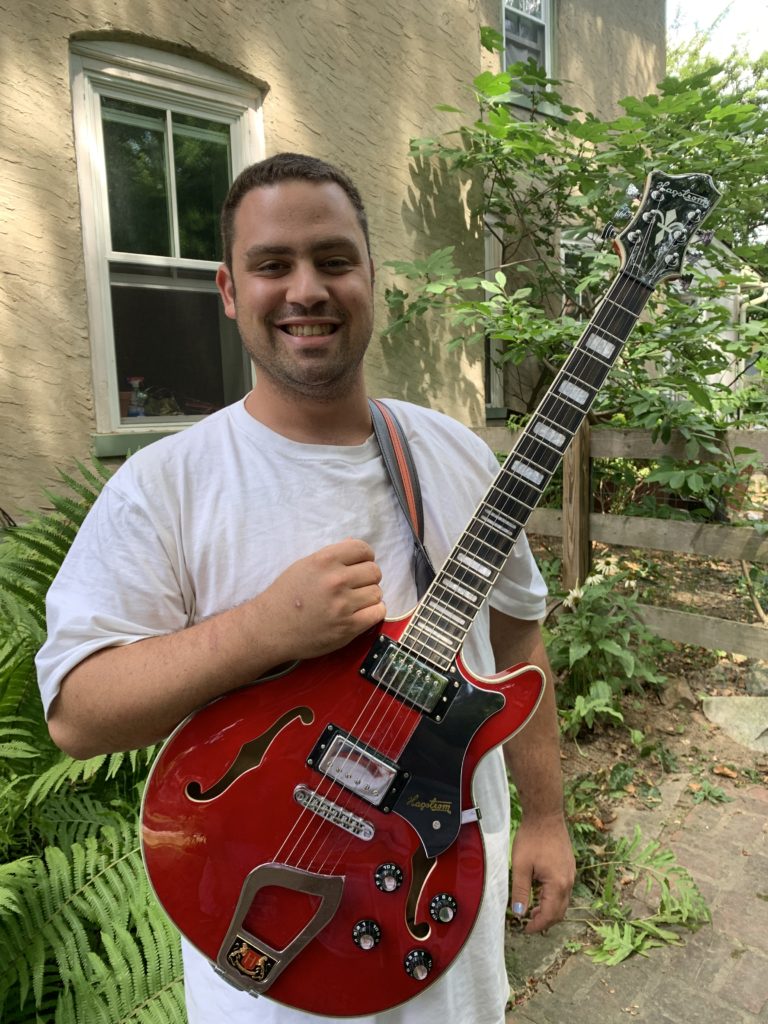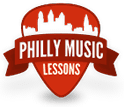
Guitar, Bass, Drums, Piano
Louis Rabin-Lobron
He/Him/His
B.S Northeastern University
Jazz, Rock, Blues, Funk, RnB
I have been playing the guitar since I was 8 years old, and it has been a great source of catharsis and joy for me. Even though I play primarily the Guitar, some of my greatest influences are (non-guitarists) Victor Wooten, John Coltrane, Nate Smith, Robert Glasper and countless others. I have experience playing in a number of ensembles, including Jazz big-bands and small combos, Rock Bands, accompanying solo singers, and with orchestras. Regardless of genre, my favorite settings to play guitar are those where I am only one texture in a collective groove. I also am constantly writing and recording original music, and would love to work with students who are interested in composing and songwriting on guitar!
My teaching style is student-centered; your goals are my goals. While pursuing whatever these goals are, I hope to facilitate broad music learning, so that students can grow as effective, rhythmic and melodic guitarists AND as effective, rhythmic and melodic musicians. I am equally interested in creating musical spaces where students can build self-esteem, agency and empathy. Music is liberating, and I intend to apply that truth in the work I share with my students.
When did you begin playing Guitar, and why?
Starting when I was about 6, I would pick up an old, almost unplayable acoustic guitar that we had lying around, and started strumming it intensely. Sometimes I would sit in front of our grand piano and attempt to strum the guitar and play notes on the piano at the same time. My parents did not enjoy these “experimental” performances, but they did think it was worth seeing if I enjoyed structured music learning, so when I was 8 I started taking guitar lessons, and I have been playing ever since!
What other instruments do you play, and what is your experience with them?
In addition to the guitar, I can play the electric bass well enough to jam with others, and spent some time in middle and high school playing classical upright bass. Playing upright in my high school orchestra while also playing electric guitar in our jazz band was one of the most rewarding, musical times of my life.
I was lucky enough to grow up with a grand piano in my house. Today, I use keyboard and piano as a tool for composing and producing music, including recording keys for one of my bands! As a multi-instrumentalist, piano skills have been essential to me for more fully understanding music theory concepts, harmony, and chord voicings, and for strengthening music reading skills.
I fully believe every kid (and adult) should have a chance to sit at a drum kit and play. I love helping early drummers learn to coordinate their feet and hands, and to find the “pocket” behind the kit, so they can enjoy playing the drum grooves from their favorite music. In my own practice, I focus on tightening up the drum parts for a soul/americana trio I play in, and exploring new patterns and types of syncopation.
What are your personal goals as a musician?
Right now, a primary goal I have as a guitarist is to continue growing as a solid rhythmic accompanist in jazz and other settings. Guitar is wonderful in its ability to be at once percussive and melodic, and I am learning from great players ranging from Joe Pass to Cory Wong to effectively combine these qualities.
More broadly, I want to hone my chops as a music teacher, and music mentor. While I am interested in facilitating skill building and musicianship, I am equally interested in working with young people using music as a tool for building self-esteem, agency and empathy.
Do you have a memory of a time when a musical concept or technique really clicked? Something you’ll remember forever?
At some point I decided I was going to learn to write and play music in odd time signatures, after primarily leaning on playing in 4/4. I love the feeling of moving from the feeling of rhythmic discomfort to the feeling that I am able to internalize and embody music that is in 7 or 9 etc. Remembering how this first felt brings me back to playing around with odd time signatures often, and to be able to manipulate time this way can feel almost superhuman when I think of where I started in my musical journey.
What is your favorite piece of advice from one of your past (or current) teachers?
Go SLOW to go fast!! I have learned this over and over again (and for any number of other life skills other than music) from many teachers. This is essential to both give your brain and body a chance to internalize new rhythms and melodies at a pace they can both handle. This is also a great way to show patience to yourself as a learner and a musician.
What was your most challenging moment learning an instrument
Very recently, I got to play in the pit of a production of Shrek The Musical. This involved learning a massive amount of music, playing from sheet music with a conductor, switching between genres and time-feels constantly, and playing tightly within an orchestra. Since I typically play solo or with a couple other people, this was a profound and rewarding challenge.
What is your biggest musical achievement?
Very recently, I finally became comfortable playing the Charlie Parker/Miles Davis tune “Donna Lee” close to the original tempo on guitar (it’s FAST, and not at all written for guitar). This feels notable because the journey of learning mostly the first 20 seconds of this piece of music perfectly exemplifies the “go slow to go fast” way of learning music that I hope to encourage in my students. I learned this melody in small chunks, and almost every repetition of it that I have played has been considerably slower than how it was originally written. This has involved
resisting my ego, which so badly wanted to know the whole thing at full speed from the jump. All of this was necessary to really instill the music in me. I know as I continue to learn difficult music, I can return to this model and just enjoy the slow ride.
Favorite thing about teaching?
My favorite thing about teaching music or just sharing in music with others, is to see joy happen for others. This can come from improving musically, but also from getting in a deep “flow”, or even from the humor in making mistakes constantly when learning something new.
What is a piece of advice you would like to share with anyone learning music?
You are not what you play. You are not what you play. You are not what you play. People that play music seriously often become lost in identifying with their instrument(s) and the music they make. I hope my students can learn to accept the joy that music brings them, and also to retain a distance that allows them to love and accept themselves no matter what their relationship to music is.
Personal music projects:
I am constantly recording original music in my makeshift bedroom studio (an iPad and a USB microphone). A journey I have been on is when to release this music for others to hear and when to hold onto it because it is either too personal, or because it is just not “done” yet.
I also have an ongoing project of connecting my music making to racial and economic justice movements. From my Patreon page and from giving informal lessons to friends and family, since mid-2020 I have raised about $1200 going directly to meet basic needs for fellow Philadelphians. This work is ongoing, and I am always reflecting on how to be accountable to the communities of color that originated so much of the canon of American music that I play and
enjoy.
